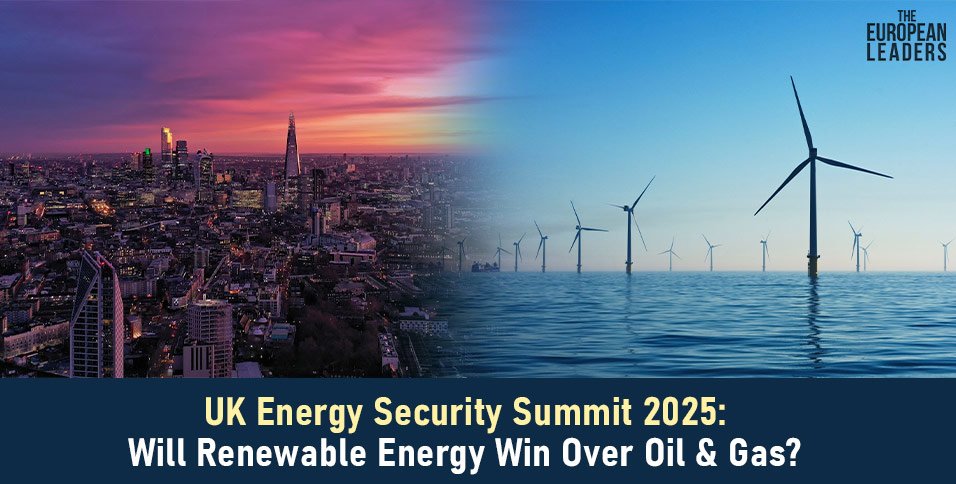The European Leaders
24 April 2025
London – In a world gripped by energy price shocks and climate urgency, the UK Energy Security Summit 2025 stands as a defining moment. Held at London’s historic Lancaster House, this high-stakes event is far more than a closed-door meeting of diplomats and CEOs it’s a strategic battlefield where the future of energy is being debated.
With over 60 countries represented and keynote leadership from UK Energy Secretary Ed Miliband and IEA Executive Director Fatih Birol, the summit may well tip the balance between renewables and fossil fuels in the years ahead.
A Turning Point in the Global Energy Landscape?
Co-hosted by the UK Government and the International Energy Agency, this year’s UK Energy Security Summit isn’t merely about securing supply; it’s about securing direction.
Will the world double down on fossil fuels in the name of affordability and resilience? Or can it pivot rapidly and reliably to offshore wind, solar, and next-gen storage technologies?
The summit’s agenda is ambitious. It aims to map out a global strategy for energy security amid geopolitical turbulence, with an emphasis on renewables as both a climate necessity and a safeguard against market volatility.
From critical minerals to clean energy tech, from gas security to Ukraine’s grid resilience, the scope is nothing short of comprehensive.
The Key Goals: Strategy, Security, and Sustainability
- Building a Holistic Energy Strategy: The UK Energy Security Summit is pushing for an integrated, future-ready framework that addresses both age-old threats—like oil and gas supply disruption—and modern risks, including cyberattacks, climate events, and clean tech bottlenecks.
- Decarbonising with Intent: The UK reiterated its bold 2030 target to fully decarbonise its electricity sector. Offshore wind is the showpiece, with £300 million pledged to scale its supply chain. The UK aims to triple its capacity and cut its fossil fuel reliance.
- Strengthening Critical Supply Chains: Clean energy is only as reliable as the materials behind it. The summit focuses on securing critical minerals like lithium, cobalt, and rare earths through diversification, ESG-compliant sourcing, and recycling.
- Global Collaboration as a Necessity: Energy interdependence is no longer optional. The summit encourages joint ventures, knowledge exchange, and harmonised regulation to ensure resilience through collective effort, not isolation.
- Investing in the Long View: Strategic investment tools, public-private partnerships, and £8.3 billion in government-backed initiatives are being deployed to make clean energy not just viable, but competitive.
Offshore Wind: The UK’s Crown Jewel
With the UK already the second-largest offshore wind market, the summit sharpened focus on this sector. The £300 million investment aims to anchor domestic manufacturing and reduce reliance on imports.
GB Energy, the new state-backed enterprise, is leading the charge. Beyond its environmental promise, offshore wind is positioned as a jobs engine, projected to create 10,000 roles and add £25 billion to the economy.
Regulatory moves are also catching up. Proposed amendments to the Great British Energy Bill will ensure supply chains remain ethical, clean, and free from forced labour, which is particularly relevant as global scrutiny grows around solar and wind imports from high-risk regions.
Solar Power: Quiet but Crucial
While solar energy hasn’t dominated headlines, it’s integral to the broader green commitment. The summit reaffirmed solar’s role in meeting 2030 targets, with potential for funding under the wider clean energy envelope. Ethical procurement, improved storage, and resilient distribution are all in play.
Critical Minerals: The Invisible Backbone
The summit doesn’t shy away from the resource realities of renewables. From securing cobalt and lithium to investing in circular economy practices, the UK is advocating for diversified sourcing and environmentally responsible mining. Technological innovation, including next-gen battery design and advanced refining techniques, is being prioritised.
Notably, the UK is aligning with partners like India and the IEA to foster knowledge-sharing, traceability, and funding models that reduce global dependency on a few dominant suppliers.
Political Crosscurrents: The Trump Factor
Across the Atlantic, Donald Trump’s vocal support for oil and gas, positioned as a job-saving, sovereignty-boosting agenda, presents a sharp ideological contrast. While his camp brands renewables as unreliable and costly, the UK and its partners argue that clean energy is no longer a luxury but a necessity for both economic stability and climate responsibility.
The tension is clear: fossil fuel proponents stress energy dominance; renewable advocates counter with long-term resilience and ethical supply chains.
Conclusion: A Summit That May Shape a Generation
The UK Energy Security Summit 2025 is more than a diplomatic showcase. It’s a crucible for decision-making that could shape energy markets for decades. As the world faces escalating climate risks and unstable supply lines, this summit is a call to act, not just to talk.
Whether renewable energy wins the day over oil and gas will depend on how deeply nations commit beyond the press releases. But one thing is certain: the UK has placed its bet on a cleaner, more secure energy future, and it’s inviting the world to do the same.







